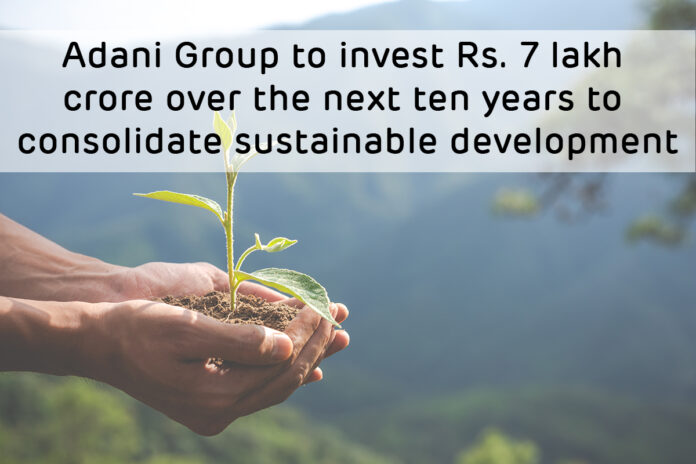The Adani Group, headed by Gautam Adani, is reportedly planning to spend 7 lakh crore rupees on capital expenditures over the next decade, according to the news agency PTI. Details of the investment plan were revealed by Gautam Adani, who emphasized the strategy’s emphasis on green projects throughout the conglomerate’s several industries.
“The portfolio recently announced its plan to invest over Rs. 7 lakh crore over the next 10 years to consolidate its preeminent position as the largest infrastructure player in India,” said Adani Energy Solutions in a stock market filing.
Net zero emissions by 2040
Adani Enterprises Ltd., the conglomerate’s crown jewel, operates in a wide range of industries, including mining, airports, solar manufacturing, transportation (both public and private), data centers, and resource management, among many others.
The country’s biggest seaport operator, Adani Ports and Special Economic Zone (APSEZ) aims to achieve net-zero emissions by 2040 and become the first carbon-neutral port operation by 2025. This plan includes electrifying cranes, switching to internal transfer trucks powered by batteries, and establishing 1,000 MW of captive renewable capacity.
By fiscal year 25 (FY25), Adani Ports and Special Economic Zone hopes to have planted mangroves throughout five thousand hectares.
The Group aims to become the first carbon-neutral port operation in the country by 2025 and achieve net-zero emissions from APSEZ by 2040. As part of its eco-friendly transition, Gautam Adani said it would electrify all of its cranes, replace all its diesel-powered internal transfer vehicles with battery-powered ITVs, and add 1,000 MW of captive renewable energy.
The Group’s ambitious goal of 5,000 hectares of mangrove plantings by FY 25 is one more way to show its commitment to environmental protection. “This is just the beginning of our journey towards a more environmentally friendly future and a clear indication of our dedication to protecting the planet,” Gautam Adani said.
The renewable energy sector is also expanding at a fast pace. Gautam Adani boasted that his firm is building “the world’s largest green energy park” in Gujarat’s Kuch deserts and posted images of the massive construction site.
Renewable energy manufacturing ecosystems
Even from orbit, you can see this massive undertaking spanning 726 sq. km of the Rann desert. With 30GW, Adani can provide electricity to more than 20 million houses. “Also, we are building one of the world’s most extensive and integrated renewable energy manufacturing ecosystems for solar and wind in our Karmabhoomi Mundra, which is just 150 km away,” he added.
This demonstrates India’s dedication to the Solar Alliance and the Atmanirbhar Bharat program, and it is a significant step forward in the country’s quest for renewable energy. The head of the Group’s city gas company, Adani Total Gas Ltd., is undergoing a “massive expansion” with “CNG and piped natural gas, compressed biogas, and e-mobility,” he said, continuing the green business sector.
Across the nation, ATGL supplies natural gas to residences and businesses via pipelines and sells compressed natural gas to vehicles. In tandem with this, it is building EV charging stations and gas refining facilities to use agricultural by-products in municipal gas infrastructure.
More charging stations
By 2030, the Group will have installed 75,000 EV charging stations. Rooftop solar panels provide electricity to each of its fifty facilities. According to Adani, its operations vehicle fleet, which travels 37 million km annually, transitioned from diesel to compressed natural gas (CNG).
The city gas business of the company, Adani Total Gas Ltd., is now seeing massive growth, focusing on compressed biogas, electric mobility, piped natural gas, and compressed natural gas. In addition to switching from diesel to compressed natural gas (CNG) for its operational vehicles, the firm plans to create 75,000 electric car charging stations by 2030.
A few of the Adani Group’s most recent ventures have been in the data center, cement, telecom, and media industries. Gautam Adani’s Group runs six airports. It has a controlling interest in Mumbai International Airport Ltd., a company that will produce no net carbon emissions by 2029.
Power via renewable sources
By 2027, Adani Power aims to have established a world record for a large metropolis by supplying 60% of Mumbai’s power via renewable sources. More than 90% of cement is made from mixed cement recycling waste, which includes fly ash and slag. This sustainable revolution is being spearheaded by cement companies Ambuja and ACC. Their mission is to plant one hundred million trees.
“We are pleased to say we are a completely sustainable airport running on 100% green energy. By bringing our CO₂ management to meet international climate goals, we have become the third Asia-Pacific organization to achieve Level 4+ ‘Transition’ in the ACA Program of ACI. By 2029, we want to have achieved net zero carbon emissions! ,” said Gautam Adani.
Committed to planting 100 million trees by 2030
Gautam Adani proudly boasts that its group business, Adani Energy, shines out with its green efforts and is the energy provider to Mumbai. Mumbai is on track to become the first big metropolis in the world to get 60% of its power from renewable sources by 2027. Currently, more than 38% of our supply is environmentally friendly. He proudly announced that Mumbai was powered by 100% renewable energy during Diwali, a significant achievement that showcases their commitment to a sustainable future.
Adani said the business was “committed to planting 100 million trees by 2030, one of the most ambitious pledges by an Indian corporate anywhere in the world.”

















